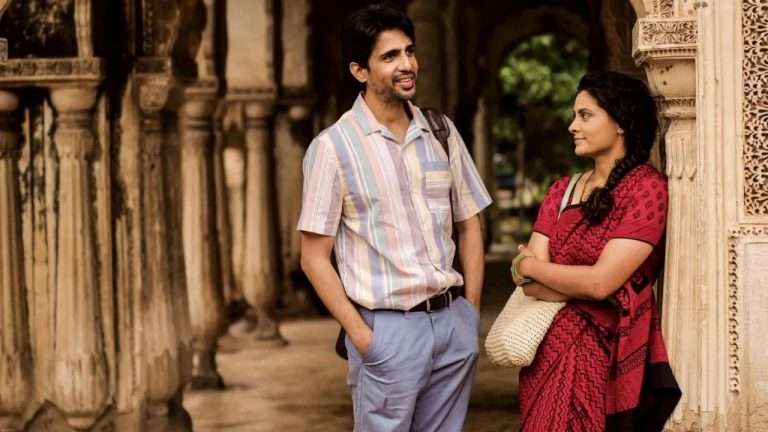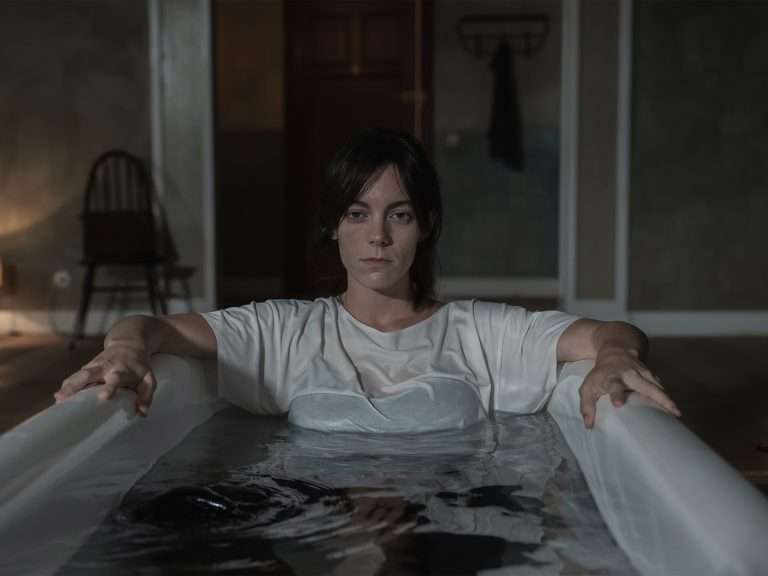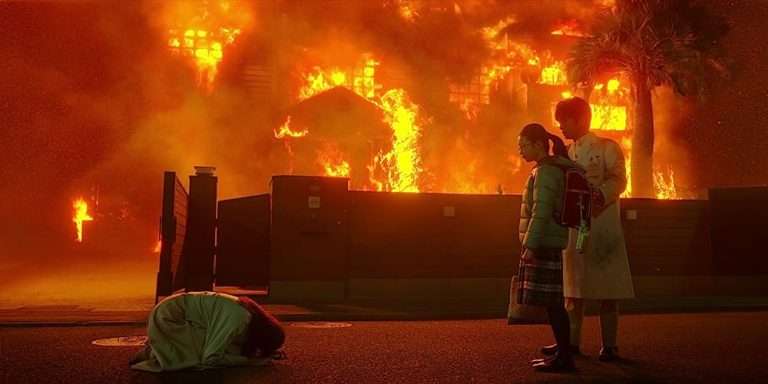When Shahrukh Khan sang, “chaand taare tod laoon, saari duniya par main chhaoon” the universe must have said Yes Boss! We can see those veritable stars shining and hooting inside every film theater screening Pathaan. People swarmed from all over the country to celebrate the much-touted comeback of India’s most beloved actor, Shahrukh Khan. The rest is what appears to be the loudest clamor the theater’s management has ever encountered. After a long, 4-year hiatus from films, Siddharth Anand unfurls the red carpet of redemption for the actor to exercise his charm and put an end to the interminable wait of his fans. However, the phenomenon that surmounted the cinemas across the country is a radical hypothesis with an explication.
The inception of Shahrukh Khan in every household in India as the boy-next-door with inexplicable charm and no background or godfather created a little flutter 30 years ago that turned into the formidable storm the country is witnessing today. The towering stardom of Shahrukh Khan is a deterministic doctrine in the realm of cinema. In its true form, cinema is believed to be a secular medium, and the phenomenon of Shahrukh Khan breathes realism into that belief.
India being the world’s largest secular country and Shahrukh Khan being the country’s biggest star only corroborates the fact that SRK is our beloved son. The incessant euphoria surrounding the release of Pathaan is not a tempest in a teapot. Only an actor of a certain caliber and stardom is capable of erasing the lurking lines of race, religion, pandemic, and language, and Shahrukh Khan is one such quintessential actor who can gravitate people from all roofs under one common roof called cinema.
Pathaan is a fictional spy embodied by the character traits of Shahrukh Khan. He is witty, charming, gallant, and gorgeous. Despite his sculpted jawline, chiseled abdomen, and long, wavy hair, he continues to entice his audience into falling in love with him. At major times, we see Pathaan spew out blood or exchange fist blows and crackled cheeks, yet his beguiling eyes dawn upon us. Pathaan is a patriotic stalwart in the film with an inherent resistance to pietism. His principle is simple and unchangeable: being in constant check with what he can do for his country albeit any political, personal, or constitutional ramifications. He heeds his superiors yet listens to his heart, as cited by Colonel Sunil, who serves as a connecting bridge for the YRF Spy Universe.
The film borrows its conflict from the psychological perception of soldiers serving their country and extends the emotion cinematically using the two titulars. While Pathaan constantly checks what he can do for his country, his nemesis, Jim (John Abraham), broods over what his Country did for him. Both battle their own demons and fight with each other’s angels. Siddharth Anand, the writer-director, uses this universal concept to create a colossal battle between the hunks, packed with thumping action maneuvers and galactic face-offs that are less on logic and more on adrenaline.
When Shahrukh appears on screen, everything disappears: gender, language barriers, cultural differences, religion, favoritism, genre preferences, everything vanishes into thin air. SRK exudes secularism with his presence. As a country rich in people of all religions, actors like Shahrukh Khan demonstrate the literal manifestation of secularism by bringing people together with no reservations. In a nutshell, that’s what stardom is all about. As people who belong to the “hero-worship” nook in the world cinema perspective, events like these really filter out the stigma of celebrating a hero because the hero offers us a medium to commemorate our secular country.
Pathaan allowed me to behold the ecstatic Muslim brother in the bottom second row and a content Christian uncle slumped in the left corner of the top row, cheering as SRK flew the chopper. At the same time, I simultaneously leaned onto my better-Hindi-speaking friend to understand the dialogue right. Shahrukh Khan is capable of bringing Ram-Waseem-David together to experience one single emotion. An emotion that has bound us together for the past 30 years. Isn’t that the greatest gift an actor can ever have?
The enormous success of Pathaan should be attributed less to Shahrukh Khan himself and more to his fans worldwide. Pathaan gave an opportunity for the bereaved fans to exonerate themselves from the pit of unsuccess and yell out a deafening sigh of success. Zero (2018), the film, presented us with a madly passionate Shahrukh swimming against his gushing success stream by playing a dwarf. Raees (2017) depicted Shahrukh Khan as a local don in non-cinematic circumstances, and Fan (2016) only succeeded in reflecting Shahrukh’s mad fan base. However, none of those films gives us the oomph of SRK, but Pathaan has galore.
Cinemas turned into cathartic galleries, the atmosphere went festive, and fans went berserk. Pathaan rekindled the anticipation of a film’s release, ranging from a sleepless before-release night to preparing paper cuttings, setting up towering cutouts, and a police lathi charge before a theatre. As we walked into the cinemas, we only found our way back by receiving what is perpetually ours: cinema and Shahrukh Khan.
Cinema as a secular medium
Inadvertently or consciously, the analogy that Shahrukh Khan drew, identifying himself, Deepika Padukone, and John Abraham as the Amar, Akbar, and Anthony of the film, dovetailing their real religions to the reel-life portrayals, gives us the true meaning of cinematic amalgamation in similitude to its audience. As a husband to a Hindu woman and father of children raised with religious syncretism, the stigma of actor-religion never mattered to the discernment of the Indian audience, for if it had mattered, the communalist-driven boycott movement wouldn’t have gone in vain.
As the venerated critic and filmmaker Jean Epstein quoted, “Cinema is indeed polytheistic, and the actors are sheer emissaries bearing the torch with forward motion.” The alleged controversy and shunning of Pathaan and its victorious win over everything is the personification of cinema as a universal religion. Cinema is a cathartic avenue in which a pitch-black room is illuminated by a white screen that intercepts projected rays. What illuminates us shall be our religion. If cinema is capable of illuminating us practically, cerebrally, theologically, and theoretically, then cinema should be our religion for the time being. The very phenomenon of the purported theory came into existence with Pathaan. That should settle the contention as to why cinema is deemed a universal religion.
Hailing from a democratic nation with a massive dominance of communal rhetoric, cinema has always been the scapegoat to celebrate religious-cathartic massacres. Albeit the concurring spurn scraping the positive cinema notion, cinema as a medium triumphantly served as a concrete bridge between the dominant culture and a more nuanced version of the reality depending on its own exigencies. This purely makes sense to comprehend the mass boycotting of a film where the protagonist is a spy selflessly toiling to protect the country. The activism that confounded the release of Pathaan openly blurs the lines of communalism and nationalism.
Most fictionally bolstered films, like Pathaan, accommodate a medley of visuals and interpretations into popular spy narrative formats in order to make them more relatable to a wider audience, including the most underprivileged and illiterate segments of society. This filmic narrative’s fragmentary structure piques interest, particularly in light of contemporary discussions surrounding the issue of agency in interpreting historical events during a politically charged period.
Pathaan is as simple to a layman as a popular Bollywood hero locking knuckles with another Bollywood hero over something preposterous or might as well be an inane element. Pathaan, too, can be a film centered on a nation on the cusp of annihilation that a dedicated soldier can save, but the only downside is the soldier’s name. As disgusting as it may sound, this is what occulted the brainwashed bureaucrats, colluding to instigate the innocuous layman, whose primitive perception of threat in the film is tangential. In the end, the traction of Pathaan proves that the film is about a soldier who perceives his country as his religion.
Despite the political and marketing ramifications, the verdict of Pathaan proved that the ratio of people who love cinema and Shahrukh Khan is much higher than everything else. Also, a great reminder that in a postcolonial era, cinema can be a democratic choice. That ratio has been a concomitant factor of a phenomenon that took 30 years in the making. Shahrukh taught us to choose wisely; it took him great introspection upon confrontation with Haridas to shift from bottled water to normal water in Swades.
Pathaan is merely a commercial Bollywood tentpole film. It is an avenue thronged by Indians to celebrate the most relatable and loved superstar on screen. The inscrutable mist that conquered Hindi cinema’s vision suddenly saw the scintillating rays that gave people a motive and a path to tread. The film rescued the depleting charm by swerving in a direction that breathed life into single screens. The rusty hinges that held the cinema seat to the ground suddenly felt the recurring force of a boisterous audience screaming their lungs out for Shahrukh Khan.
Celebrating Shahrukh Khan
On The Anupam Kher Show, Shah Rukh Khan was asked by the thespian whether he fears losing his stardom in the future. With his iconic smile crowned by a steely sense of pride, he replied: “I’m the last of the stars.” Keeping aside his wit and charm as an individual, Shah Rukh Khan’s impeccable self-consciousness makes him unique. He is what he says he is. His wordy manifestations make us bet on the actor as our forever trustee. The hovering shield of stardom never made Shahrukh Khan formidable. He is the most accessible (mentally), relatable, and innocuous superstar whose stardom emanates positivity and trust.
Speaking to the mid-day newspaper, Sharanya Bhattacharya (The author of the bestseller Desperately Seeking Shahrukh Khan) emphasizes the impact Shahrukh Khan has on people, especially women, so she decided to choose Shahrukh Khan as a medium to get her thesis on women’s employment (post-colonization) across to all classes of women in India. While conducting her interviews in the hamlets of Gujarat and Uttar Pradesh to understand women’s employment and working conditions, Sharanya Bhattacharya couldn’t help but notice that Shahrukh Khan was the only mantra that could get the women talking about their plight. “Shahrukh is the only icebreaker that leads the conversation forward,” she affirmed. He is in every woman’s league, from working-class women to a multimillionaire’s scion.

As a country, we are far behind in the world’s women’s employment list. Amidst the impoverished lifestyle, male intransigence, socio-political shackles, and disdained bureaucrats, Shahrukh Khan is the only actor who happens to be the one common solution for activists to gravitate women to self-awareness boot camps. That vastness was his charm and connection, which extended beyond star labels and religious segregation. Religion is incapable of bringing people into one’s singularly congenial company. Cinema can do it, and Shahrukh certainly does.
Fandom, or hero adoration, is a deeply ingrained cultural tradition in every Indian filmgoer. However, the magnetism that Shahrukh Khan possesses is inexorable. In a country where women are worshipped with devotion and where there are more female deities than male deities in ancestral temples and shrines, Shahrukh is the only actor-star perceived by women as the man who earnestly acknowledges their mundane labor. As aforementioned, Shahrukh Khan was never a masculine, self-conceited, patriarchal man.
Shahrukh Khan is a fictional formulation harbored by the women who accompany them in the kitchen, cry with them, and serve as their emotional companions. His chivalrous nature on and off screen, his candidness in speaking about women, his self-deprecating humor, and his sharp wit contribute to the perception of Shahrukh in every household. Ironically, the male scrutiny has proved to be more telepathic than women, as they coherently seek the traits of Shahrukh Khan to keep the romance with their loved ones buoyant.
Indian women, psychologically, never intended to marry Shahrukh Khan, smother him with kisses, or snuggle in SRK’s open arms. They are using Shahrukh as a metaphor for their lives. Shahrukh Khan provides a passage for us to find solace in him. When we are sad, his commemoration of losing his parents at a young age, feeling alone in the hustle-bustle of Bombay, helps us virtually join hands in solidarity. His immaculate weaving of words and the analogies he draws from his stories comfort people in harmony. Even in the much-touted action drama Pathaan, SRK’s masculinity is simmered down by his malleability.
Unfortunately, for women of rural backgrounds, the simple joy of watching a film is stolen freedom. It is an unaccustomed occasion where women can celebrate their autonomy. And Shahrukh Khan keeps that female gumption alive and validated. He plays the Raj, who’s enamored of Simran. He plays the Om, who secretly admires a superstar, a halwai facing off with hulk to win meenamma, a scientist whose success is calibrated by his gratefulness for the nanny. The films of Shahrukh Khan validate the liberation from mundanity or celebrate the significance of being kind. The definition of hero in Shahrukh Khan’s dictionary is about succumbing to love. In a country where women are supposed to be respected and worshipped, Shahrukh Khan precisely does that with passion, which ought to explain his unfathomable fame.
Shahrukh Khan is a miracle witnessed by the whole country. With cinema as his court and the people as his advocates, he has donned the art of transcending cinema; his sustainability as a star is an evidential final verdict. Shahrukh Khan gives assurance to the sobriquet “King of Bollywood” attributed to him by the Indian audience. Shahrukh Khan is not a studio-generated star product or a synthesized star material; he is a personification of ceramic art molded by Indians.
Nostalgia is the fuel for Shahrukh Khan’s stardom. Shahrukh, as a star, is untouchable, but as an actor, he is a most palpable figure who is as big as the hearts of his fans. He might be the last of the stars or the quintessential definition of a star. Shahrukh upholds the heterogeneity of the nation through his films. His film Pathaan is a testimony to the diversity that cinema and Shahrukh Khan can evoke in this nation.








![[Teaser Talk] Barbie (2023) by Greta Gerwig](https://79468c92.delivery.rocketcdn.me/wp-content/uploads/2022/12/Barbie-2023-teaser-768x432.webp)